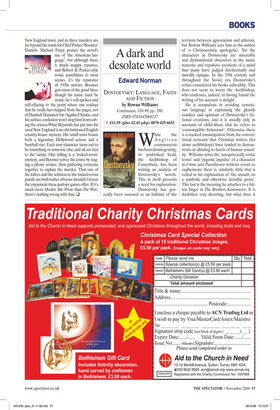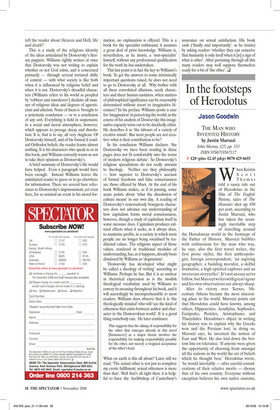A dark and desolate world
Edward Norman
DOSTOEVSKY: LANGUAGE, FAITH AND FICTION by Rowan Williams Continuum, £16.99, pp. 290, ISBN 9781847064237 ✆ £13.59 (plus £2.45 p&p) 0870 429 6655 While the Anglican communion has been disintegrating, its symbolical head, the Archbishop of Canterbury, has been writing an analysis of Dostoevsky’s novels. This in itself presents a need for explanation: Dostoevsky has generally been assessed as an habitué of the territory between agnosticism and atheism, but Rowan Williams sees him as the author of ‘a Christocentric apologetic’. Yet the characters in Dostoevsky are miserable and dysfunctional obsessives in the main; neurotic and repulsive creations of a mind that many have judged intellectually and morally opaque. In the 19th century and throughout the Soviet era Dostoevsky’s critics considered his books unhealthy. This does not seem to worry the Archbishop, who confesses, indeed, to having found the writing of his account ‘a delight’.
He is scrupulous in avoiding censorious language in explaining the ghastly conduct and opinions of Dostoevsky’s fictional creations, and it is usually only in accounts of child-abuse that he refers to ‘contemptible behaviour’. Otherwise there is a marked emancipation from the conventional restraint that Christian writers (let alone archbishops) have tended to demonstrate in alluding to facets of human sexuality. Williams notes the ‘unequivocally erotic terms’ and ‘orgastic impulse’ of a character in Crime and Punishment without resort to euphemism; there is, similarly, little that is veiled in his explanation of ‘the assault on a symbolic and otherwise invisible penis’. This last is the meaning he attaches to a bitten finger in The Brothers Karamazov. It is doubtless very diverting, but what does it tell the reader about Heaven and Hell, life and death?
This is a study of the religious identity of the ideas articulated by Dostoevsky’s literary puppets. Williams rightly notices at once that Dostoevsky was not writing to explain whether or not God exists, and is concerned primarily — through several tortured shifts of context — with what society is like both when it is influenced by religious belief and when it is not. Dostoevsky’s dreadful characters (Williams refers to his world as peopled by ‘robbers and murderers’) declaim all manner of religious ideas and degrees of agnosticism and atheism. None of them is brought to a systematic conclusion — or to a conclusion of any sort. Everything is held in suspension, in a social and moral atmosphere, however, which appears to presage decay and dissolution. It is, that is to say, all very Anglican. Of Dostoevsky himself, and of his formal if residual Orthodox beliefs, the reader learns almost nothing. It is his characters who speak to us in this book, and Williams correctly warns us not to take their opinions as Dostoevsky’s.
A brief summary of Dostoevsky’s life would have helped. Even a paragraph would have been enough. Instead Williams leaves the uninitiated reader to guess or to go elsewhere for information. There are several bare references to Dostoevsky’s imprisonment, yet even here, for so seminal an event in his moral for mation, no explanation is offered. This is a book for the specialist enthusiast; it assumes a great deal of prior knowledge. Williams is, nevertheless, as he insists, a ‘non-specialist’ himself, without any professional qualification for the work he has undertaken.
This last point is in fact the key to Williams’s book. To get the answers to some intrinsically important questions raised, he does not need to go to Dostoevsky at all. Why bother with all these convoluted allusions, seedy characters and sheer human nastiness, when matters of philosophical significance can be reasonably determined without resort to imaginative literature? In his preface Williams posits a case for ‘imagination’ in perceiving the world; in the course of his analysis of Dostoevsky this imaginative capacity turns out to be decidedly elitist. He describes it as ‘the labours of a variety of creative minds’. But most people are not creative: what is their contribution to be?
In his conclusion Williams declares ‘the Dostoevsky we have been reading in these pages does not fit comfortably into the terms of modern religious debate’. So Dostoevsky’s religious speculations do not really amount to theology. Neither are they philosophy — how superior to Dostoevsky’s account of formal freedoms and false consciousness are those offered by Marx. At the end of his
44 P
book Williams makes, as if in passing, some acute points about ‘what the dissolution of culture means’ in our own day. A reading of Dostoevsky’s remorselessly bourgeois characters does not advance our understanding of how capitalism forms moral consciousness, however, though a study of capitalism itself in some measure does. Capitalism produces cultural effects when it seeks, as it always does, to maximise profits, in a society in which most people are no longer being socialised by traditional values. The religious aspect of those values, rendered in traditional modules of understanding, has, as it happens, already been dismissed by Williams as ‘dogmatism’.
‘Dostoevsky has developed what might be called a theology of writing’ according to Williams. Perhaps he has. But it is as unclear in rhetorical expression as is the modish theological vocabulary used by Williams to convey its meaning throughout his book, and it will accordingly be incomprehensible to most readers. Williams does observe that it is ‘the theologically minded’ who will ‘see the kind of otherness that exists between author and character in the Dostoevskian world’. It is a good thing somebody can. He later continues: This suggests that the taking of responsibility for the other that emerges already in this novel [Karamazov] as a major theme involves the responsibility for making responsibility possible for the other, not merely a resigned acceptance of the other’s load.
What on earth is this all about? Later still we read, ‘The sexual other is not just to complete my erotic fulfilment; sexual otherness is more than that’. Well that’s all right then: it is helpful to have the Archbishop of Canterbury’s assurance on sexual satisfaction. His book ends (‘finally and importantly’, as he insists) by asking readers ‘whether they can conceive that humanity is only itself when it [is] a sign of what is other’. After persisting through all this many readers may well suppose themselves ready for a bit of ‘the other’. q



































































































 Previous page
Previous page